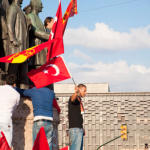
Last week, Turkey’s National Education Council voted to make the teaching of Ottoman Turkish compulsory in high schools. In 1928, Ataturk, the founder of modern Turkey, modernized the Ottoman language, replacing its Arabic alphabet, in use for than a thousand years, with Latin script. He also purged the language of many of its Arabic, Persian, and Greek words to create a new “pure” Turkish closer to the language people actually spoke.
Turkey’s President Recep Tayyip Erdogan supports the highly symbolic move which has enraged secularists who claim he is pursuing an increasingly Islamist agenda, and that his vow to reintroduce Ottoman turkish “no matter what they say” was another bid to roll back Ataturk’s secular reforms, which were based on a strict separation between religion and state. This led to Erdogan’s prime minister insisting that learning the language would not be mandatory.
However, Erdogan argued that the language was necessary to restore Turks’ severed ties with “our roots”, as most Turks are unable to read the tombstones of their ancestors. “There are those who do not want this to be taught. This is a great danger. Whether they like it or not, the Ottoman language will be learnt and taught in this country,” Erdogan told a religious council meeting in the capital, Ankara.
“It’s not a foreign language. It’s a form of Turkish that will never age. Therefore it will be taught no matter what they say,” he added. And, he evocatively added, “History rests in those gravestones. Can there be a bigger weakness than not knowing this? This (departure from the Ottoman language) was equal to the severing of our jugular veins.”
Ottoman Turkish evolved as the administrative language of the multi-ethnic Ottoman Empire, out of which Ataturk created Turkey’s modern republic but, even at the time of the Empire’s collapse after WWI, Ottoman Turkish was only in general use by the ruling elite.
The move needs to be approved by the education ministry to take effect, but the ministry has in the past implemented the majority of them.
Erdogan, who took over Turkey’s presidency in August after serving as prime minister for more than a decade, has long been accused of Islamizing Turkey’s officially secular education system.


